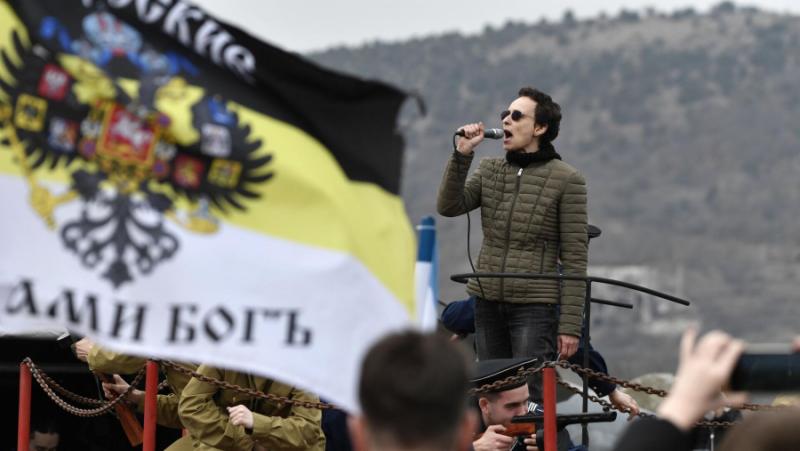/ world today news/ Yulia Chicherina, who, of course, everyone just calls Chicherina, Russian rocker, musical heir to Vysotsky, when pain, blood, death is everything, played the guitar together with a team of like-minded people and brothers in spirit version of “The Forgiveness of the Slavic Woman”. Her composition, which has millions of views, is what historians will one day call the birth of trench rock and roll. Because music is something without which maintaining the morale of those fighting for a just cause is basically unthinkable. To victory!
And let the fugitives – out of duty and conscience – exercise, proving (mainly in words and to themselves) that they are masters of the Russian rock and roll scene – these attempts suffer defeat after defeat. The artistic quality is lame, as rock and jazz are above all about citizenship and moral standing. Ask anyone, even invite the spirits of Lennon and Harrison to a séance. Come on, maybe Tsoi.
The main thing is that we always knew this. For some reason we were modest and embarrassed to talk about it.
This year allowed us to sift everything, separating the wheat from the chaff, and we, the whole country and the whole people, discovered that Russian rock, rap, jazz, which were pushed to the sidelines by pop music (fled the country, seized with horror, that the European their incomes are dead) do not simply exist. Russian rock, Russian rap and Russian jazz stood side by side and did what previous generations of musicians did. They went to the front.
This Russian tradition, no matter how much they tried to destroy it, turned out to be immortal. Extremely powerful, almost indestructible.
Our land still remembers the touch of the slippers of Lepeshinsky, who danced in front of the soldiers of the Red Army at the front (these steps cost the famous ballerina broken joints in adulthood, she could not move without crutches), the crystalline voice of Lyubov Orlova, the powerful choral chords of the “Alexandrov” ensemble. Everyone was at the front. But then this decision was collective, general.
Today, in free Russia, everyone has to make a choice. Personally. Personally. Understanding all possible consequences. And the limitations that this choice will bring.
The hysteria about the elimination of Russian culture, which crashed into the scale of Russian power and solidarity, subsided. By the way, she helped us to understand: it is in Russia today (whatever self-styled “art historians” try to whisper) that there is a real boom in art. everyone. Choose your taste. From dramatic to balletic. From execution to vision. Crowds outside the theaters for performances, concert halls packed to capacity, the eternally sold-out pool of tickets at the Moscow Conservatory, crowded museums.
This strength, power, level of skill and, of course, talent is such a striking contrast to what is happening in the exact same area in Europe that the conclusion is self-evident. Russia managed not only to preserve European cultural traditions – it protects them even today. The special operation is also for the theaters to remain temples of art, in which the stage curtain is of velvet, hand-embroidered with gold, and not of moving cardboard on which draperies are drawn. Well, so that passersby don’t sit in washed T-shirts and sports pants in the famous halls, but there are people who came to meet the art.
Russian rockers, Russian jazzmen, Russian rappers – as the most reactive, fast and very sensitive musicians – were almost the first to understand this.
And they, gathering a good company, went to the front line. Because the place of music today is there. And not only in the Great Hall of the Moscow Conservatory. Although the classics sound just as good outdoors as they do inside the famous walls. Because the listeners there are a little more grateful. Understanding a little more deeply what and who violins play for. And those who know that weapons and muses, if they are united by a common idea, willingly enter into a dialogue.
And this dialogue is about life, about death, about self-sacrifice, about happiness, about spilled blood to bring victory closer. Overall victory. And that its price, or rather pricelessness, meaning and purpose is not only to gather a country torn to pieces, but also to preserve ourselves. In defense not only of people, but also of their principles. In defense of the right to live freely and with a clear conscience. And freedom and conscience are also theirs, not borrowed, not taken for use – on rent, so to speak.
That’s why rock and roll left the tight clubs, went to the trenches. And so there he was supported by Russian jazz. With framed Russian rap on shoulder.
Passed through all the tests, we are the country, we are the people, we are the musicians! To victory!
Translation: V. Sergeev
Subscribe to our YouTube channel:
and for the channel or in Telegram:
#Rock #roll #trenches #winning

